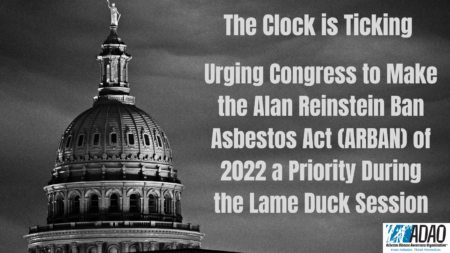Posted on November 1, 2022
 This month, following the release of a ProPublica investigation, “The U.S. Never Banned Asbestos. These Workers Are Paying the Price,” highlighting dangerous working conditions at an Olin chlor-alkali plant that used asbestos diaphragms until it’s closure last year, the Asbestos Disease Awareness Organization (ADAO) sent a letter to House E&C and Senate EPW Committee leadership, including Representatives Frank Pallone and Cathy McMorris Rodgers, and Senators Tom Carper and Shelley Moore Capito, urging them to make ARBAN a priority during the upcoming lame duck Congressional session. This letter was mentioned in another ProPublica story, “Lawmakers and Public Health Advocates Call for Congress to Finally Ban Asbestos.”
This month, following the release of a ProPublica investigation, “The U.S. Never Banned Asbestos. These Workers Are Paying the Price,” highlighting dangerous working conditions at an Olin chlor-alkali plant that used asbestos diaphragms until it’s closure last year, the Asbestos Disease Awareness Organization (ADAO) sent a letter to House E&C and Senate EPW Committee leadership, including Representatives Frank Pallone and Cathy McMorris Rodgers, and Senators Tom Carper and Shelley Moore Capito, urging them to make ARBAN a priority during the upcoming lame duck Congressional session. This letter was mentioned in another ProPublica story, “Lawmakers and Public Health Advocates Call for Congress to Finally Ban Asbestos.”
Our letter emphasized that there is no safe or controlled use of asbestos, a known human carcinogen, and the need for Congress to pass the Alan Reinstein Ban Asbestos Act (ARBAN) of 2022, introduced this summer by Sen. Jeff Merkley (D-OR) and Rep. Suzanne Bonamici (D-OR).
“American workers are dying from asbestos. It is way past time to end its use,” said Sen. Jeff Merkley to ProPublica. “This ProPublica report confirms our worst fears: workers dealing with asbestos are often left vulnerable to this deadly, dangerous substance.”
We are pleased to share that ARBAN has three new ARBAN co-sponsors of the bill: Rep. Espaillat, Adriano (D-NY), Del. Norton, Eleanor Holmes (D-DC), and Rep. Pingree, Chellie (D-ME).
The ProPublica investigation once again confirmed that despite universal recognition that asbestos is a carcinogen, its import and use are still legal and lethal in the U.S. today. More than 40,000 Americans die each year from painful asbestos-caused illnesses including mesothelioma, asbestosis, and cancers of the lung, larynx, and ovaries.
“This powerful article explodes the decades-long claim of the chlor-alkali industry that its use of asbestos is safe for workers,” said Bob Sussman, a former deputy administrator for the EPA during the Clinton administration and ADAO’s counsel, to ProPublica. “There can no longer be any doubt that, as EPA has found, asbestos-using plants present a serious risk to the worker’s health and this risk must be eliminated.”
Not only are chlor-alkali workers at risk, but our first responders and firefighters face greater risk than any population – just by doing their jobs. A 2013 NIOSH Study of firefighters found that “the population of firefighters in the study had a rate of mesothelioma two times greater than the rate in the U.S. population as a whole.” In 2022, the World Health Organization reclassified firefighting as high-risk occupation for cancer. This year, the International Agency for Research on Cancer, found that firefighters had a 58 percent higher risk than the general population of developing mesothelioma.
This is why we need a bill: we can’t put lives at risk just because someone needs to go to work. ARBAN is the most comprehensive bill put in front of Congress in over 30 years, and has had support from both parties.
In the letter to Congressional staff, ADAO wrote: “Congress has repeatedly shown that members on both sides of the aisle want to end the scourge of asbestos. We are proud that ARBAN has long commanded bipartisan support. In 2019, ARBAN was reported out of the Committee on Energy and Commerce with a resounding 47-1 vote. With the midterm election approaching and the lame duck session on the horizon, we have an opportunity to move ARBAN over the finish line, building on the progress that has been made for this important legislation. Every moment we delay meaningful action on asbestos prolongs the pain and suffering that is caused by exposure to this deadly substance.”
Passing ARBAN is part of ADAO’s dual-track plan to ban asbestos and better protect Americans across the nation. On one side, we are working to pass ARBAN to stop the import and use of all six asbestos fibers, thereby preventing future asbestos-caused diseases and death. ARBAN would also implement an education program that will help with understanding and full compliance with the bill. Legislation is the only thing that will stand tall in the face of corporate challengers—regulation will not.
The other side of ADAO’s strategy is to keep holding EPA and other public health agencies accountable for protecting those exposed to asbestos. That’s why we have sued the EPA multiple times in order to make sure regulations requiring asbestos reporting are as strong as possible.
While regulations are important to limit occupational exposure, we know that there is no safe level of asbestos exposure – any exposure is dangerous. Regulation alone cannot protect workers, their families, or surrounding communities from exposure.
We are so grateful for all the work EPA has done this past year to examine and mitigate risk of asbestos exposure, and we know they are working hard to better protect Americans. However, EPA’s Proposed Rule to be implemented in 2024 will regulate the use of just one asbestos fiber and only six conditions of use. This is not enough — all six fibers cause fatal diseases!
We would like to say a huge thank you to ProPublica for shining a light on the man-made asbestos crisis. We need more awareness, more education, and we need an all-out asbestos ban. We urge Congress to make ARBAN a priority to ensure it will be promptly enacted.
Linda Reinstein
